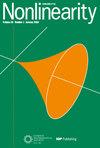Hamiltonians for the quantised Volterra hierarchy
IF 1.6
2区 数学
Q2 MATHEMATICS, APPLIED
引用次数: 0
Abstract
This paper builds upon our recent work, published in Carpentier量子化伏特拉等级体系的哈密顿拳
这篇论文建立在我们最近发表在卡彭蒂耶等人(2022 Lett.我们还发现了一个耐人寻味的方面:该层次结构的所有奇度对称性都允许一种替代的、非变形的量子化,从而在量子化参数ω的任何选择下都会产生一个非交换代数。在这项研究中,我们证明了量子伏特拉层次结构中的每个方程都可以用海森堡形式来表达。我们提供了所有量子哈密顿的明确表达式,并建立了它们的交换性。在经典极限中,这些量子哈密顿量产生了换元伏特拉层次结构中经典哈密顿量的明确表达式。此外,我们还提出了非变形量子化情况下的海森堡方程及其哈密顿。最后,我们讨论了两种量子化背景下的换元初积分、量子代数的中心元素以及 Volterra 晶格周期性还原的可积分性问题。
本文章由计算机程序翻译,如有差异,请以英文原文为准。
求助全文
约1分钟内获得全文
求助全文
来源期刊

Nonlinearity
物理-物理:数学物理
CiteScore
3.00
自引率
5.90%
发文量
170
审稿时长
12 months
期刊介绍:
Aimed primarily at mathematicians and physicists interested in research on nonlinear phenomena, the journal''s coverage ranges from proofs of important theorems to papers presenting ideas, conjectures and numerical or physical experiments of significant physical and mathematical interest.
Subject coverage:
The journal publishes papers on nonlinear mathematics, mathematical physics, experimental physics, theoretical physics and other areas in the sciences where nonlinear phenomena are of fundamental importance. A more detailed indication is given by the subject interests of the Editorial Board members, which are listed in every issue of the journal.
Due to the broad scope of Nonlinearity, and in order to make all papers published in the journal accessible to its wide readership, authors are required to provide sufficient introductory material in their paper. This material should contain enough detail and background information to place their research into context and to make it understandable to scientists working on nonlinear phenomena.
Nonlinearity is a journal of the Institute of Physics and the London Mathematical Society.
 求助内容:
求助内容: 应助结果提醒方式:
应助结果提醒方式:


